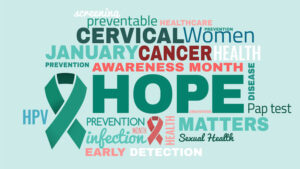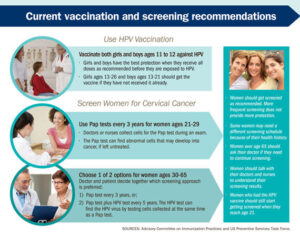
January is Cervical Cancer Awareness Month, but since the start of the COVID-19 pandemic, patients are hesitant to get a Pap test and screening, due to the fear of catching COVID.
Now, local health experts are encouraging patients to get regular screening as it can be a life saver.
In the United States, cervical cancer was once the leading cause of death from cancer among women. Since the pandemic started, screenings have fallen by more than 90 percent. Most doctors advise women to get their first Pap test at age 21, as 93 percent of cervical cancer cases could’ve been impeded. But many women avoid their screenings.
Rachel Eisenberg, a nurse practitioner for Planned Parenthood, said the screenings can be game changers.
“These screenings are a game changer for our patients, that’s why it’s so important to have it done, and I think that’s why there’s a whole month that focuses around it. A lot of patients are also reluctant to come in for their Pap and screenings for the fear of contracting COVID-19, and they keep putting them off. I think it’s definitely something that we need to bring to the forefront to try and get patients back in,” Eisenberg said in an interview with WCTV.
When cells shift in the female cervix, cervical cancer can occur, which connects the uterus with the vagina. Cancer can affect their cervix’s deeper tissues such as the liver, lungs, vagina, bladder, and rectum. Many forms of cervical cancer are exacerbated by human papillomavirus contamination.
The regional coordinator at the Florida Department of Health, Natasha Coleman, said there are a number of symptoms that an individual may get at the beginning of cervical cancer.

“Cervical cancer usually starts with a Pap smear result. Some symptoms that may begin is abdominal pains or excessive discharges. Some patients can have a small flat bump around their vaginal area. We encourage our patients to at least get a basic Pap smear checkup every three years as cancer in the cervix is the 15th leading cause of cancer deaths,” Coleman said.
The Centers for Disease Control and Prevention suggests women not smoke and limit the number of sexual partners, as well as get an HPV vaccine between the age of 9 and 26 to lessen the risk or avert cervical cancer. The examination for HPV searches for the infection, which can trigger the changes in the cells. As the Pap examination detects for pre-cancerous, cell modifications on the cervix that, if not properly treated, could become cervical cancer.
Stephanie Allen, a junior psychology student at Florida A&M, said it’s important to understand what cervical cancer is.
“It surprises me, as a community our women are afraid to get Pap smears tested at screening due to this pandemic. I would think because of what’s going on in society individuals would be more proactive in going to the doctors and getting tested. Not only does this affect the community but families because it is something that could be prevented. I would choose fear over death. Doctors are put in these positions to help in the community, and we are missing an opportunity if we keep ignoring these screenings that are provided to us. Doing a screening can cause us to identify cancer at an early stage and stop it before it is too late, ”Allen said.